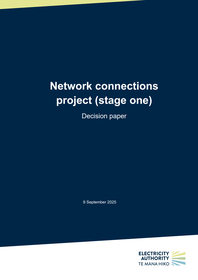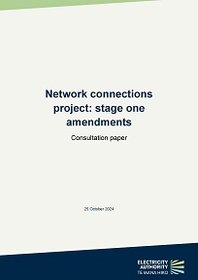Network connections project – stage one
Decision
We’re implementing eight of our nine proposed changes to remove barriers and create efficiencies in the application process for connecting distributed generation (like solar farms) and large load (like industrial plant) to networks.
We think these changes will make connecting to the network easier, faster, more equitable and more consistent across New Zealand.
These rule changes support our economy through efficient development of new businesses, electricity and critical infrastructure. They also benefit consumers by reducing the time and cost to deliver new housing, and infrastructure such as public EV charging stations, manufacturing and solar farms.
Many of the proposals have been amended to make the new requirements clearer and more workable for both parties, without changing the intention behind the proposals. These amendments are in response to submitter feedback during the consultation period. We also received advice from the independent Network Connections Technical Group.
The amendments include providing greater flexibility for distributors to collectively design and manage their own connection processes. We note the next stages of this project provide opportunities for further changes if we don’t see meaningful action that supports the intended outcomes.
Following a technical consultation in September and October 2025, we have finalised the Code to give effect to the new requirements.
The Code will be gazetted in early 2026 and most of the new requirements come into effect on 1 December 2026. The exception is the load application processes, which will come into effect on 1 June 2027.
We are planning workshops to help distributors get ready for the new requirements.
Following a technical consultation in September and October 2025, we have finalised the Code to give effect to the new requirements.
The Code will be gazetted in early 2026 and most of the new requirements come into effect on 1 December 2026. The exception is the load application processes, which will come into effect on 1 June 2027.
Note, on 9 September 2025, we republished the decision paper that has been updated to correct three minor errors. The corrections are noted on page 7 of the updated decision paper below. We apologise for any confusion this may have caused.
Consultation open on two remaining issues
One of the changes we made is adding the application process for large energy users (load) into the Code. The original proposal included an obligation on distributors to connect all applications if certain criteria are met.
We consider there should be obligations for distributors to connect those who seek to connect load. We have considered the feedback we received in late 2024 and are now consulting on our proposed approach for clarifying and introducing obligations on distributors so it’s clear when distributors must offer and maintain connections.
In the same consultation paper, we are seeking feedback on a related proposal to address inefficiently high up-front charges for connecting to networks.
Submissions on these proposals are due by 5pm, 19 December 2025.
Consultation
The Code requirements for connecting to distribution networks have served us well in the past. But demands on our networks are changing, and we need future-ready requirements that better serve consumers, distribution businesses, and those wanting to connect to the network or upgrade their existing connection (access seekers). In October 2024, we sought feedback on nine proposed Code changes to improve the application process for connecting to networks.
Webinar
We held a one-hour webinar on Monday 11 November to talk through the proposals in this consultation paper and answer questions. The webinar also included a presentation about the complementary Distribution connection pricing consultation paper. Watch the webinar and read the transcript.
Complementary consultation
Alongside this consultation, we welcome your feedback in the Distribution connection pricing proposed Code amendment consultation.
This consultation runs over the same time period and aims to address some barriers to efficient pricing for connecting to distribution networks.
Together, the proposals across these consultations aim to support more efficient investment in infrastructure, which lowers overall costs to consumers, and supports a growing, thriving and electrified New Zealand.
Submissions
-
Air New Zealand5 pages
-
Anonymous6 pages
-
Aurora Energy18 pages
-
Awhitu Windfarms Ltd2 pages
-
BEC8 pages
-
BP NZ4 pages
-
Buller Electricity9 pages
-
Chargenet7 pages
-
Contact Energy7 pages
-
Counties Energy6 pages
-
Counties Energy Trust6 pages
-
Drive Electric33 pages
-
EEA (Late submission)37 pages
-
EA Networks7 pages
-
EECA6 pages
-
Electra Trust4 pages
-
ENA14 pages
-
ERANZ3 pages
-
ETNZ6 pages
-
Fonterra2 pages
-
Genesis Energy4 pages
-
IEGA16 pages
-
Lightyears3 pages
-
Lodestone Energy8 pages
-
Manawa6 pages
-
Meridian9 pages
-
MEUG3 pages
-
NewPower Energy20 pages
-
New Zealand Port Company2 pages
-
Northpower6 pages
-
Orion26 pages
-
Powerco143 pages
-
Powernet12 pages
-
Retyna4 pages
-
Revolve Energy7 pages
-
Rewiring Aotearoa2 pages
-
Scanpower4 pages
-
SEANZ6 pages
-
The Lines Company4 pages
-
Transpower3 pages
-
Trust Horizon4 pages
-
Unison and Centralines17 pages
-
Unison and Powerco - Incenta Report21 pages
-
Vector24 pages
-
Waipa Networks10 pages
-
Waipa Networks Trust5 pages
-
Wellington Electricity13 pages
-
Wellington International Airport8 pages
-
WEL Networks9 pages
-
West Coast Electric Power Trust4 pages
-
Z Energy and Flick10 pages
Cross-submissions
-
Buller Electricity2 pages
-
ChargeNet4 pages
-
Counties Energy Trust7 pages
-
ENA18 pages
-
ETNZ2 pages
-
Orion8 pages
-
Fonterra2 pages
-
IEGA6 pages
-
Meridian2 pages
-
MEUG5 pages
-
Powerco11 pages
-
Unison and Centralines13 pages
-
Vector36 pages
-
Vector and HoustonKemp25 pages
-
Vector and Axiom Economics16 pages
-
Wellington Electricity2 pages
-
Z Energy and Flick3 pages

